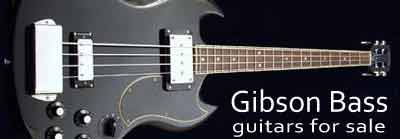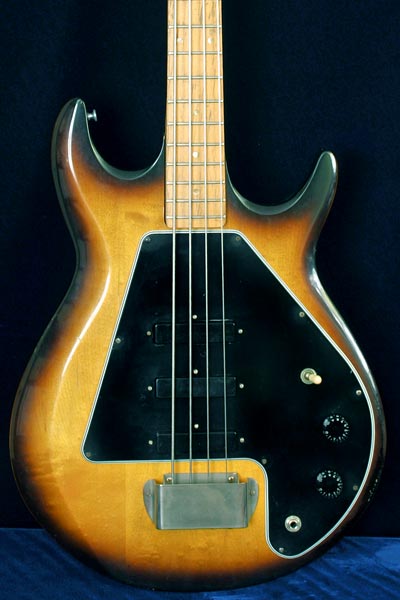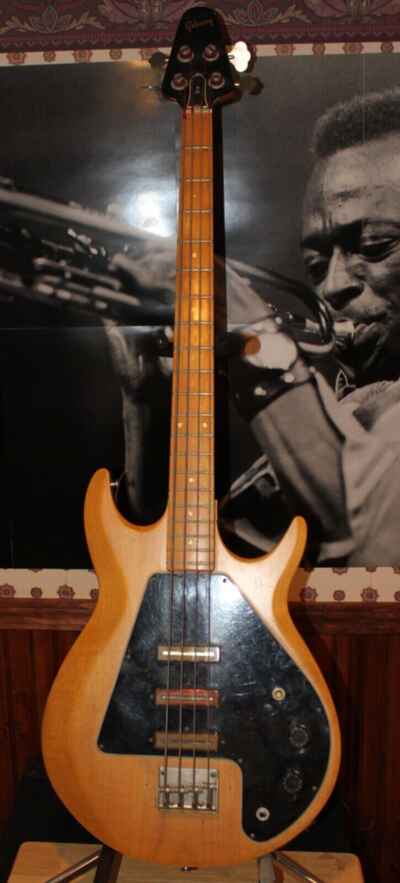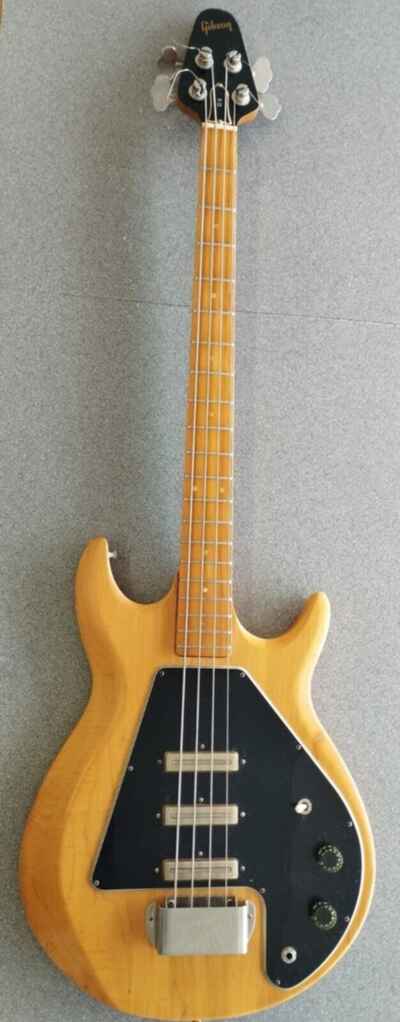• Solid maple or alder body • maple neck • maple or rosewood fretboard • 34 1/2 inch scale
The Gibson G-3 bass, or Grabber 3 bass, was launched in 1975, first shown alongside the Grabber at the 1975 NAMM show where it was very well received, with significant orders placed. They were initially referred to by Gibson as V-series basses, most likely because of the Flying V style headstock.
The G-3 was based on the Grabber, the main difference being the pickup configuration. The G3 features three single coil pickups wired in humbucking configuration, whilst the Grabber, had one 'sliding' humbucker. Both were the product of guitar designer Bill Lawrence who joined Gibson in the early 1970s. and produced a number of similar guitar models at the same time, such as the Marauder, L-6S and S-1.
Have a closer look at two examples of the Gibson G-3 below.
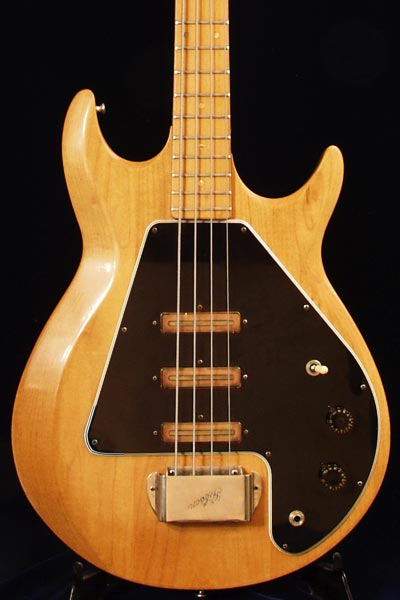 1976 Gibson G3 - Maple Gloss finish
1976 Gibson G3 - Maple Gloss finish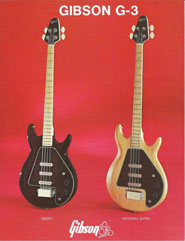 Gibson G-3 bass advertisement - for more adverts, original pricing and catalogue appearances see pricing and publicity
Gibson G-3 bass advertisement - for more adverts, original pricing and catalogue appearances see pricing and publicityGibson G3 Controls
Woods and Construction
The G-3 and Grabber both had bolt-on maple necks, and maple or alder bodies. Fingerboards were typically maple, though occasionally rosewood or ebony. All this maple, added to the bolt-on construction leads to a very bright sounding bass; plenty of snap.
The lightweight Grabber bridge was not designed to hold strings, rather they are passed through the body and then over the bridge, and so improving sustain. Extra long scale strings are therefore required.
Gibson G-3 Finishes
Like G1s, G3s were available in several finishes: Ebony, Natural Maple Gloss (maple body), Natural Satin (alder body), Sunburst (initially listed as just Sunburst, then Tobacco Sunburst, and finally Antique Sunburst), Walnut and Wine Red. It is not mentioned as being available in White in the G3 production totals. The rare colours are Walnut (40) and Wine Red (9). In the early 1980s, Candy Apple Red was another finish offered.
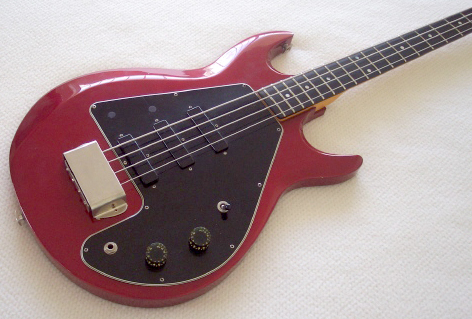
The 1980s
The last price list / catalogue appearance of the G3 was in 1980, but as is often the case with Gibson, they still made them for a little longer. They were made at the Gibson Kalamazoo factory from 1975-1982 or maybe later. In 1985 some G3s were stamped in the Nashville plant, though in very small numbers, so potentially using Kalamazoo bodies and necks. These last G-3s often had very striking highly flamed three-piece maple necks.
This 1982 G-3 is unusual in having an ebony fingerboard, and Candy Apple Red finish. This colour was being widely used at the time on the eighties Victory basses, and was never offered on seventies instruments.
Picture courtesy of Uwe Hornung.

Shipping figures for Gibson G3 bass guitar
| 1975 | 1976 | 1977 | 1978 | 1979 | total | |
| Grabber G3 | 337 | 118 | 57 | 512 | ||
| Grabber G3 - Ebony | 455 | 316 | 259 | 95 | 1125 | |
| Grabber G3 - Natural Maple Gloss | 9 | 104 | 30 | 143 | ||
| Grabber G3 - Natural Satin | 751 | 488 | 574 | 216 | 2029 | |
| Grabber G3 - Sunburst | 60 | 143 | 156 | 70 | 429 | |
| Grabber G3 - Walnut | 37 | 3 | 40 | |||
| Grabber G3 - Wine Red | 1 | 6 | 1 | 1 | 9 | |
| Total | 397 | 1359 | 1107 | 1025 | 399 | 4287 |
The G3 was produced from 1975; two years after the Gibson Grabber and Gibson Ripper basses. It was shipped from the Gibson Kalamazoo plant beyond 1979, although shipping figures are not available for this period. The last appearance of the G3 in a Gibson price list was July 1980, also the last listing for the Grabber and Ripper. Basses with serial numbers dating into the early eighties do come up, with Candy Apple Red as a new finish option. A (very) few Nashville serial numbered G-3s exist, all with 1985 serial numbers. Grabber shipping figures | Ripper shipping figures
Gibson G-3 Bass FAQ
Frequently asked questions about the Gibson G3 bass
My G3 has no bridge cover... should it have?
Almost certainly; most G3s were shipped with a bridge cover, only the very last instruments shipped in 1982 and 1985 did not.
Was the G3 bass available in the older, 'wide' body style of the early Gibson Ripper
No, the Gibson G3 bass was only produced after the introduction of the narrower body style; the Ripper also changed to this shape in 1974.
Was all G3 production at the Gibson Kalamazoo plant in Michigan?
The vast majority of G3 basses were produced in Kalamazoo, however a few of the very last basses from 1985 have Nashville serial numbers - although these may have been partially built in Kalamazoo, but then completed and shipped from Nashville. It is highly unlikely that the Nashville plant actually built G3 basses from scratch.
Gibson G-3 bass for sale
Vintage 1976 Gibson G3 Grabber Electric Bass with original hard Gibson Case
East Amherst, New York, 140**, UNITED STATES OF AMERICA
$3200
All Original Vintage 1977 Gibson Grabber G-3 Bass Guitar
Fort Worth, Texas, 761**, UNITED STATES OF AMERICA
$2995
Gibson G-3 Used Electric Bass Guitar
Porth, CF39***, UNITED KINGDOM
£2557
Serial numbner: 06167800
3 position switch controlling the 3 pick-ups with volume and tone controls
This instrument was purchased by me in Cardiff south Wales in early 1982.... more
Hi, thanks for this informative and helpful resource. I've had my G3 bass from new in the 70s. Just to add some additional information, the serial number of my alder bodied natural satin finish is six digits starting with a 5*****
Just got a G3 with serial number 00196628. Assume that makes it a 1976, made in Kalamzoo, correct? A previous owner removed the original lightweight Grabber bridge described in this article that lets the stings pass through the body and then over the bridge. This was replaced with a bridge that holds the strings. Would it be advisable, or even possible to restore the original bridge?
I am in the same boat with you Bryan. I recently purchased a G3 that was advertised as an '82, but upon checking the serial number with the folks at Gibson, I'm told it's a 1975. It's had some work done on it, including a different bridge that appears to be a cheap generic Fender style. The space in the back where the original string through fitting was has been filled in and painted over. I am also wondering if it's worth the time and effort to restore, or if I should just upgrade to a higher quality bridge and call it good enough.
I´ve got a Grabber 3 with serial number 00196159. It had a hell of a life, and now i´m restoring it. It has a maple body, an was originaly clear gloss. I believe it´s a 1976 but i´m not sure. Can you tell me the year of manufacture?
I have a G3 all natural it has all black pickups the body is stamped A with a mar.5-81 date code the pickups and pots are stamped mar. 78 it has no bridge cover and no holes in the body also the neck plate is NOT engraved with GIBSON it is plain I saw one on EBAY not engraved and it was referred to as a KALAMAZOO neck plate? it has an 8 digit ser.# beginning 83404 any thing special about this guitar as far as value and how many were made? Not sure if this is an 83 or 84 your thoughts please thanks
I just bought a G3 bass body and I'm just wondering how to tell if it's the maple body or the laser body. It's the natural finish and has the recessed spot on the back where the metal string holder would've gone (it was removed but it's not the 4 individual holes). I think it's maple but since they made them in alder and maple in natural finishes at the same time I can't tell which one it is. I also have a 76 Grabber that was originally wine red (since refinished). How can I tell if that one is maple or alder? I know it's a 76 because it's got the individual string holes in the back and the watermark serial number. Finally, I love your page, it's been a great resource for me for all of my Gibson basses, I just wish you had a page for Explorer basses. That is the one bass I can't find much info on. Thank you for this awesome website.
I have recently bought a black G3 that was advertised as a 1980 model, but has Bill Lawrence pickups and the serial #500000 pressed into the back of the headstock..can you tell me the year build and units produced (it is black) which leads me to believe it is a '76 model.
You are correct, a G3 bass built in 1980 would most likely have an eight digit serial number. Finish color is less significant, and their were certainly black Gibson G3 basses in the early 1980s. Six-digit serial number necks were built and stamped en-masse prior to fitting to basses, so determining an accurate date from them is also problematic. But yes, broadly speaking the neck was most likely produced between '74 (the Grabber uses the same neck) and '76. You could look at the pot codes, which gives you a 'not-shipped-before' date, but these were also assembled in advance. If it were mine, i'd quite happily call it a '76, though some parts may have been produced before this, and the bass may not have actually shipped until later. Perhaps your original owner bought it new in 1980?
The article indicates that G3 production was launched in 1975. The serial number on my G3 (963845) indicates production in Kalamazoo or Nashville between 1971 - 1973. Please clarify. Thanks, Bill Davis
Hi Bill, Have you ever received a reply and/or found out about this?
Hi Bill, six digit serial numbers were still in use half way through 1975, including many beginning 9*****; and although the majority of G3 basses have the eight digit decal or eight digit stamped logos, older six digit examples are not especially rare. At this stage the G3 was produced in Kalamazoo. As far as I have been able to determine, only the final G3s shipped in 1985 were produced in Nashville.


